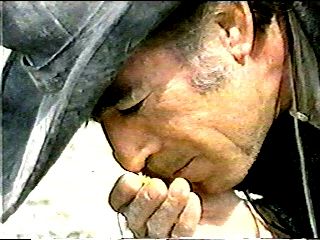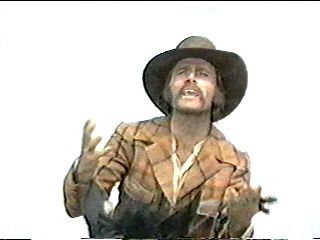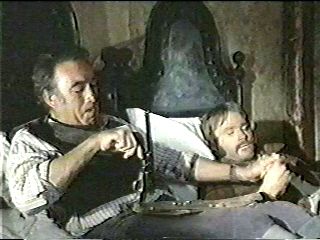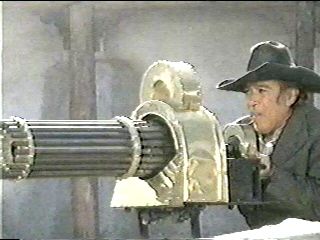
|
|
|
|
|
|
|
|
|
|
|
|
|
(1973) Director: Paola Cavara
Apart from the fact that it has a goofy title that might
make some potential The idea of an actor with the stature of Anthony Quinn appearing in a spaghetti western, especially when the actor is nearing the age of 60 upon starring in the movie, may seem somewhat hard to fathom, even with the knowledge that just five years earlier he appeared in another spaghetti western, Guns For San Sebastian. But Quinn manages to overcome these obstacles and come across quite comfortably in the proceedings. He does get some assistance from director Paola Cavara - wisely, he is never dressed in a flashy style, instead being covered with old and dusty clothing that with his grizzled and unshaven appearance almost makes him blend into the landscape. And though Cavara does make Quinn's Smith character go through some action and stuntwork, none of it is outlandish; I could believe a man Quinn's age in real life doing the same things if pushed to do them. Most of the burden does still fall on Quinn, and it's a credit to his acting skills that he successfully manages the task of convincingly playing such a challenging character - a deaf-mute assigned a dangerous mission - in an atypical setting. Not only must we believe he is deaf and mute, but he also has the difficult task of conveying to us what he is feeling and thinking without talking. Quinn leaves that to his facial expressions, and when his Smith character is feeling jovial, worry, or fear, there is no mistake in interpreting how his face expresses his emotion. What makes it even better is how effortless, how natural his expressions looks - it's as close to real life as acting can get. Though Franco Nero at the time was certainly no stranger
to the spaghetti western genre (Companeros,
Django), here he gets a rare chance to play
an action And when Nero is simultaneously onscreen with Quinn... well, the movie generates that magic that we frequently crave to encounter whenever we engage in cinema. Though they are two radically different actors playing two radically different characters, there's no mistaking the instant chemistry the two conjure up when they are placed together. It may seem odd that the serious Smith would pair up with a ladies' man who keeps getting his attention by chucking pebbles into his back, but we soon see that Smith has his own quirks that mystify Johnny, such as his curious habits of strumming a jaw harp and putting his watch to his ear. It doesn't take long for us to realize that these two oddball personalities are in fact right for each other. Incidentally, the alternate title of this movie is Los Amigos, and a significant portion of the movie does indeed focus on the relationship between the two men. Johnny may yell and violently disagree with Smith about plans to infiltrate the enemy fort, but as he argues we realize that though his request to Smith to abandon the mission and ride off could be considered selfish, we see he genuinely cares about his friend. One interesting aspect of this friendship that's revealed is that it isn't that Johnny thinks Smith can't take care of himself, but that Johnny himself would feel helpless without Smith. Anyway, their relationship leads to some great scenes, the best being a wonderful wordless sequence when they are setting a trap for the enemy; it's clear by their faces and actions that things don't get much better than when you are with a friend, working together, and fully confident about the future. There are times when life is absolutely wonderful to experience. Scenes like that one are where the movie finds its
power, so much so that it's very curious that there actually aren't as
many scenes of Smith and Johnny together as you might think. Despite
that the title and premise Though I guess all of Johnny's girl-chasing does provide at least some degree to providing insight into his character, all of this focus on it not only makes the movie much longer than it should be, but it comes at the expense of providing any insight into the character of Smith. This is not a criticism of Quinn's performance - he does an excellent job with what he's given. The problem is that he's not really given that much. I realize the difficulty of having a deaf-mute character express himself and reveal his past to an audience, but I still think something could have been revealed. Instead, we have a character shrouded by mystery. How did he become a secret agent despite his handicaps? What did he do even before that? What does he plan to do after the mission, with or without Johnny? That last question is especially important, since several times in the movie Johnny lets on that supposedly he and Smith have plans. But we never know what Smith thinks of all this, and as a result the last action he makes in the movie has no impact, since we don't know what made him decide this. This is not the only time when the movie gets annoyingly
vague on details. There's one bit not long after the movie starts,
running not more than five minutes, Paola Cavara's direction is competent but mostly unexceptional. The few notable moments, like the surprisingly tense sequence when Smith is sneaking around the enemy fort unaware something on his person risks giving his presence away, seem almost like accidents. He does manage a not-bad shoot-up action climax, though it is somewhat jarring after the movie has lulled the audience with its previously sedate tone for so long. About the only other kind of effort Cavara seems to be giving the movie is making sure it has a more American look to it than other spaghetti westerns, despite shooting on distinctive Spanish locations. (Including that mini-waterfall we seem to see in every other Italian movie.) The American feeling to this movie even extends to Daniele Patucchi's music, though he makes a very pleasing atypical spaghetti western score with a nice choice of stringed instruments. The movie overall is equally pleasant, but no more. It's a movie made for people who are already spaghetti western fans; as for if it would convert those unfamiliar or rejecting of the genre, well, that's a different story.
Check for availability on Amazon. See also: Bad Company, Chino, Your Three Minutes Are Up |
 separate from
Mexico. However, the situation in the Republic is still volatile; there
are internal groups, some supported by foreign powers, that aim to have
Texas for themselves, one of the biggest being lead by General Lucius
Morton (Franco Graziosi). However, president Sam Houston is aware of
the plot against him and the Republic, and he assigns his best agent to
infiltrate and quash the brewing rebellion. That agent is Erastus
"Deaf" Smith (Quinn), who just happens to be a deaf-mute. Riding with
him is his friend "Johnny Ears", (Nero), who not only acts as his ears,
but helps to conceal his friend's handicaps from anyone they encounter.
Which is especially necessary, since Morton and his forces have
intercepted government communication so that they not only know someone
is after them, but that they know to be on the lookout for a deaf-mute.
separate from
Mexico. However, the situation in the Republic is still volatile; there
are internal groups, some supported by foreign powers, that aim to have
Texas for themselves, one of the biggest being lead by General Lucius
Morton (Franco Graziosi). However, president Sam Houston is aware of
the plot against him and the Republic, and he assigns his best agent to
infiltrate and quash the brewing rebellion. That agent is Erastus
"Deaf" Smith (Quinn), who just happens to be a deaf-mute. Riding with
him is his friend "Johnny Ears", (Nero), who not only acts as his ears,
but helps to conceal his friend's handicaps from anyone they encounter.
Which is especially necessary, since Morton and his forces have
intercepted government communication so that they not only know someone
is after them, but that they know to be on the lookout for a deaf-mute. hero that's different from the other cowboys
he's played, as well as being different than the tough-guy cop,
solider, and ninja roles of his that we are more familiar with. Here he
gets to play someone who, though serious when the chips are clearly
down, isn't as quick-witted and brave, someone less irresponsible who
often lets what is between his legs dictate his immediate actions. The
horniness and lustful pawing of his Johnny Ears character actually does
make for a few amusing sequences, mostly because Nero plays these
actions as if his character is unaware that others might find them
inappropriate and impolite. Had he made his character get even just
part of his jollies from the discomfort of others he generates, it
wouldn't have worked. Nero freely lets himself be portrayed as a
goofball, even letting himself wear an outfit that was out of style
even in 1836 Texas, and he's fun to watch. I've always liked Nero, but
this role really showed me just how versatile he is. He even gets a few
bits where he has to engage in some Terence Hill-like acrobatics, and
does a pretty respectful job in doing these stunts.
hero that's different from the other cowboys
he's played, as well as being different than the tough-guy cop,
solider, and ninja roles of his that we are more familiar with. Here he
gets to play someone who, though serious when the chips are clearly
down, isn't as quick-witted and brave, someone less irresponsible who
often lets what is between his legs dictate his immediate actions. The
horniness and lustful pawing of his Johnny Ears character actually does
make for a few amusing sequences, mostly because Nero plays these
actions as if his character is unaware that others might find them
inappropriate and impolite. Had he made his character get even just
part of his jollies from the discomfort of others he generates, it
wouldn't have worked. Nero freely lets himself be portrayed as a
goofball, even letting himself wear an outfit that was out of style
even in 1836 Texas, and he's fun to watch. I've always liked Nero, but
this role really showed me just how versatile he is. He even gets a few
bits where he has to engage in some Terence Hill-like acrobatics, and
does a pretty respectful job in doing these stunts. of
the movie suggest this is going to be a buddy-film, instead the movie
at times seems determined to separate the two of them, and then only
deciding to bring them back together when it absolutely has to. For
example, midway through the movie Smith and Johnny are riding the range
in order to locate where the rebel forces are stationed. They find a
fort, and when Smith decides they should infiltrate it, he and Johnny
get into a major disagreement and Johnny rides off. Then there is a
very long sequence where Smith sneaks in, looks around, is spotted,
chased, and picks off the pursuing party one by one. Johnny then
reappears after the fight is more or less over, with no explanation as
to why he returned. Speaking of Johnny, he also gets his fair share of
scenes when Smith is not around, and they almost all involve his
pursuit of women. Though I did mention that his horniness does provide
some amusement, it does eventually become tiring after seeing scene
after scene of his girl-chasing, especially since all of this has
virtually no bearing on the plot. Had it all been snipped out by the
editor, the running time of this movie would be significantly shorter.
of
the movie suggest this is going to be a buddy-film, instead the movie
at times seems determined to separate the two of them, and then only
deciding to bring them back together when it absolutely has to. For
example, midway through the movie Smith and Johnny are riding the range
in order to locate where the rebel forces are stationed. They find a
fort, and when Smith decides they should infiltrate it, he and Johnny
get into a major disagreement and Johnny rides off. Then there is a
very long sequence where Smith sneaks in, looks around, is spotted,
chased, and picks off the pursuing party one by one. Johnny then
reappears after the fight is more or less over, with no explanation as
to why he returned. Speaking of Johnny, he also gets his fair share of
scenes when Smith is not around, and they almost all involve his
pursuit of women. Though I did mention that his horniness does provide
some amusement, it does eventually become tiring after seeing scene
after scene of his girl-chasing, especially since all of this has
virtually no bearing on the plot. Had it all been snipped out by the
editor, the running time of this movie would be significantly shorter. when the movie
abruptly cuts from Smith secretly discovering his contact was murdered
to Smith suddenly in town. Shortly afterwards, the movie abruptly cuts
to him on the ranch of his contact with a woman we've never seen him
with previously, and almost as abruptly we suddenly see him spying on
Morton in a different location. What makes this jarring editing even
more annoying is that the forty or so minutes surrounding it sure
aren't in any hurry. In the first half or so of the movie, Smith and
Johnny do practically nothing concerning their mission, spending a lot
of their time in saloons or whorehouses instead (and usually not
together.) While this material in itself isn't painful to sit through,
you have to wonder why they are going to all this trouble here instead
of using the time to strengthen the meat of the story. That also
includes the villain. If there was ever another spaghetti western with
a villain somehow more unthreatening and bland as General Morton, I've
somehow missed it. Not only does he barely have any screen time, he
does so little that could be considered "evil" that when Smith and
Johnny were toying with him in the climatic sequence that I actually
felt sorry for the guy, a seemingly harmless man being bullied around.
when the movie
abruptly cuts from Smith secretly discovering his contact was murdered
to Smith suddenly in town. Shortly afterwards, the movie abruptly cuts
to him on the ranch of his contact with a woman we've never seen him
with previously, and almost as abruptly we suddenly see him spying on
Morton in a different location. What makes this jarring editing even
more annoying is that the forty or so minutes surrounding it sure
aren't in any hurry. In the first half or so of the movie, Smith and
Johnny do practically nothing concerning their mission, spending a lot
of their time in saloons or whorehouses instead (and usually not
together.) While this material in itself isn't painful to sit through,
you have to wonder why they are going to all this trouble here instead
of using the time to strengthen the meat of the story. That also
includes the villain. If there was ever another spaghetti western with
a villain somehow more unthreatening and bland as General Morton, I've
somehow missed it. Not only does he barely have any screen time, he
does so little that could be considered "evil" that when Smith and
Johnny were toying with him in the climatic sequence that I actually
felt sorry for the guy, a seemingly harmless man being bullied around.